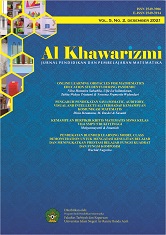Ability to Understand Mathematic Concepts: The Effect of The Hermeneutic Model Assisted by Gamification Teaching Materials
DOI:
https://doi.org/10.22373/jppm.v5i2.11114Keywords:
Hermeneutics Learning Model, Gamification Teaching Materials, Mathematical Concept Understanding AbilityAbstract
The ability to understand mathematical concepts in learning mathematics needs to be mastered by students to support the learning process and solve various mathematical problems. This study aims to determine the effect of the Hermeneutics-Assisted learning model of gamification teaching materials on the ability to understand mathematical concepts of students. This research is a type of Quasy Experimental Design research with a 3×1 factorial research design. The data collection technique in this study was a test of the ability to understand mathematical concepts. The data analysis techniques used are normality test, homogeneity test, and one-way analysis of variance. Based on the results of the study, it was concluded that there was an effect of applying the Hermeneutics learning model assisted by gamification teaching materials on the ability to understand students' mathematical concepts. Hermeneutics learning model assisted by gamification teaching materials has a significant influence on the ability to understand mathematical concepts of students.References
Apiati, V. dan Hermanto, R. (2020) “Kemampuan Berpikir Kritis Peserta Didik Dalam Memecahkan Masalah Matematik Berdasarkan Gaya Belajar,” Mosharafa: Jurnal Pendidikan Matematika, 9(1), hal. 167–178.
Casella, G. dan Berger, R. L. (2002) Statistical Inference. 2 ed. Pacific Grove CA: Duxbury.
Diana, P., Marethi, I. dan Pamungkas, A. S. (2020) “Kemampuan Pemahaman Konsep Matematis Siswa: Ditinjau Dari Kategori Kecemasan Matematik,” SJME (Supremum Journal of Mathematics Education), 4(1), hal. 24–32.
Febriantika, A. A. (2019) “Kemampuan Pemahaman Konsep Matematis Ditinjau dari Kompetensi Keahlian,” AlphaMath, 5(2), hal. 1–8.
Habibi, Triyana, I. W. dan Kurniawati, Y. (2020) “Analisis Berpikir Kritis Matematis Siswa SMP Ditinjau dari Gaya Kognitif Visualizer dan Verbalizer,” Indonesian Journal of Mathematics and Natural Science Education, 1(2), hal. 99–110.
Inayatusufi, C., Hakim, L. El dan Sari, P. (2020) “Peningkatan Kemampuan Pemahaman Konsep Matematis melalui Model Kooperatif Tipe Scramble dengan Pendekatan Kontekstual Pada Materi Segiempat dan Segitiga di Kelas VII,” Jurnal Riset Pendidikan Matematika Jakarta, 2(2), hal. 28–37.
Ntjalama, K. M., Murdiyanto, T. dan Meiliasari (2020) “Pengaruh Model Pembelajaran Kooperatif Tipe STAD Berbantuan Media Kahoot! Terhadap Kemampuan Pemahaman Konsep Matematis Siswa,” Jurnal Riset Pendidikan Matematika Jakarta, 2(2), hal. 13–20.
Prasadi, A. H., Wiyanto, W. dan Suharini, E. (2020) “The Implementation of Student Worksheet Based on STEM (Science, Technology, Engineering, Mathematics) and Local Wisdom to Improve of Critical Thinking Ability of Fourth Grade Students,” Journal of Primary Education, 9(3), hal. 227–237. doi: 10.15294/jpe.v9i3.37712.
Putri, I. N., Ahied, M. dan Rosidi, I. (2019) “Pengaruh Model Pembelajaran Hermeneutika Terhadap Kemampuan Berpikir Kreatif Siswa,” Natural Science Education Reseach, 2(1), hal. 1–7.
Sari, Y. A. et al. (2020) “Penerapan Cooperative Learning Tipe Tapps Menggunakan Bahan Ajar Gamifikasi Terhadap Penalaran Matematis Ditinjau Dari Kepercayaan Diri Peserta Didik Kelas Viii Smp,” Journal of Mathematics Education and Science, 3(2), hal. 61–67. doi: 10.32665/james.v3i2.140.
Selfia, R., Jazuli, L. O. A. dan Samparadja, H. (2020) “Pengaruh Model Pembelajaran Generatif Terhadap Kemampuan Pemahaman Konsep Matematis Siswa Kelas VII SMP Negeri 34 Konawe Selatan,” Jurnal Penelitian Pendidikan Matematika, 8(1), hal. 135–148.
Sukaesih, E. S., Indiati, I. dan Purwosetiyono, F. X. D. (2020) “Kemampuan Pemahaman Konsep Matematis Siswa dalam Memecahkan Masalah Kontekstual Ditinjau dari Komunikasi Matematis Siswa,” Imajiner: Jurnal Matematika dan Pendidikan Matematika, 2(4), hal. 310–320.
Sundary, P., Jatmiko, A. dan Widyastuti, R. (2020) “Metaphorical Thinking Approach With Google Classroom: Its Effect Towards Students’ Understanding Of Mathematical Concept Skills,” Indonesian Journal of Science and Mathematics Education, 3(1), hal. 37–47.
Syafruddin, M. A. dan Herman, H. (2020) “Pengaruh Model Pembelajaran Kooperatif Tipe TGT (Team Group Tournament) Terhadap Kecerdasan Emosi Siswa MAN 2 Makassar,” Jendela Olahraga, 5(1), hal. 52–58. doi: 10.26877/jo.v5i1.4267.
Winata, R. dan Friantini, R. N. (2020) “Kemampuan Pemahaman Konsep Matematika Siswa Ditinjau Dari Minat Belajar Dan Gender,” AlphaMath, 6(1), hal. 1–13.
Wirawan, Y. M. dan Putra, R. W. Y. (2018) “Pengembangan Bahan Ajar Gamifikasi pada Materi Himpunan,” Desimal: Jurnal Matematika, 1(3), hal. 329–335.
Yulianti, Murdani, E. dan Kusumawati, I. (2019) “Pengaruh Penerapan Model Pembelajaran Hermeneutika terhadap Motivasi Belajar dan Hasil Belajar Siswa pada Materi Kalor di Kelas X,” Variabel, 2(1), hal. 24–30.

